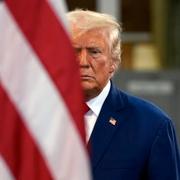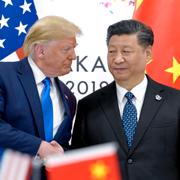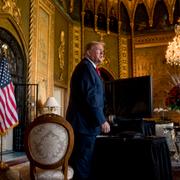
Besvikelse i Taiwan över Donald Trumps förlust
Donald Trumps kritik mot Kina har gjort honom populär i självstyrande Taiwan, rapporterar AFP.
Nu är flera i landet oroade över att Joe Bidens politik kommer att vara mjukare mot grannen Kina.
– Ingen annan världsledare vågar skälla på Kina och tala för Taiwan som Trump gör, säger Shanna Lee, boende i Taipei.
Inför det amerikanska valet visade en undersökning i tolv asiatiska länder och territorier att en majoritet i Taiwan ville att Trump skulle vinna valet.
Läs mer
bakgrund
Politiska statusen i Taiwan
Wikipedia (en)
The controversy regarding the political status of Taiwan, sometimes referred to as the Taiwan Issue or Taiwan Strait Issue, or from a Taiwanese perspective as the Mainland Issue, is a result of the Chinese Civil War and the subsequent split of China into the two present-day self-governing entities of the People's Republic of China (PRC; commonly known as "China") and the Republic of China (ROC; commonly known as "Taiwan").
The issue hinges on whether the islands of Taiwan, Penghu, Kinmen, and Matsu should remain the territory of the ROC as an effectively separate self-governing entity; become part of the PRC under the existing communist government; convert the ROC to a new "Republic of Taiwan"; unite with the mainland under the ROC government (after the dissolution of the PRC government); or merge with the mainland under newly formed alternative (federal) government (such as Federal Republic of China or United States of China).
This controversy also concerns whether the existence and legal status as a sovereign state of both the ROC and the PRC is legitimate as a matter of international law.
Taiwan, Penghu, Kinmen, Matsu, and some other minor islands effectively make up the jurisdiction of the state with the official name of the Republic of China (ROC) but commonly known as "Taiwan". The ROC, which took control of Taiwan (including Penghu and other nearby islands) in 1945, ruled mainland China and claimed sovereignty over Outer Mongolia (now Mongolia) and Tannu Uriankhai (part of which is present day Tuva, Russia) before losing the Chinese Civil War to the Communist Party of China (CPC) and relocating its government and capital city from Nanjing (alternately spelled as "Nanking") to Taipei as temporary capital in December 1949. The CPC established new government on the mainland as People's Republic of China (PRC) in October 1949.
Since the ROC lost its United Nations seat as "China" in 1971 (replaced by the PRC), most sovereign states have switched their diplomatic recognition to the PRC, recognizing the PRC as the representative of all China, though the majority of countries avoid clarifying what territories are meant by "China" in order to associate with both the PRC and ROC. As of 20 September 2019, the ROC maintains official diplomatic relations with 14 UN member states and the Holy See, although informal relations are maintained with nearly all others. Agencies of foreign governments such as the American Institute in Taiwan operate as de facto embassies of their home countries in Taiwan, and Taiwan operates similar de facto embassies and consulates in most countries under such names as "Taipei Representative Office" (TRO) or "Taipei Economic and Cultural (Representative) Office" (TECO). In certain contexts, Taiwan is also referred to as Chinese Taipei.
The ROC government has in the past actively pursued the claim as the sole legitimate government over mainland China and Taiwan. This position began to change in the early 1990s as democracy was introduced and new Taiwanese leaders were elected, changing to one that does not actively challenge the legitimacy of PRC rule over mainland China. Both the PRC and the ROC carry out Cross-Strait relations through specialized agencies (such as the Mainland Affairs Council of the ROC), rather than through foreign ministries. Different groups have different concepts of what the current formal political situation of Taiwan is. (See also: Chinese unification, Taiwan independence movement, and Cross-Strait relations)
In addition, the situation can be confusing because of the different parties and the effort by many groups to deal with the controversy through a policy of deliberate ambiguity. The political solution that is accepted by many of the current groups is the perspective of the status quo: to unofficially treat Taiwan as a state and at a minimum, to officially declare no support for the government of this state making a formal declaration of independence. What a formal declaration of independence would consist of is not clear and can be confusing given the fact that the People's Republic of China has never controlled Taiwan and the Republic of China still exists, albeit on a decreased scale.
The status quo is accepted in large part because it does not define the legal or future status of Taiwan, leaving each group to interpret the situation in a way that is politically acceptable to its members. At the same time, a policy of status quo has been criticized as being dangerous precisely because different sides have different interpretations of what the status quo is, leading to the possibility of war through brinkmanship or miscalculation. The PRC seeks the end of Taiwan's de facto independence through the process of reunification, and has not ruled out the use of force in pursuance of this goal.
Omni är politiskt obundna och oberoende. Vi strävar efter att ge fler perspektiv på nyheterna. Har du frågor eller synpunkter kring vår rapportering? Kontakta redaktionen



